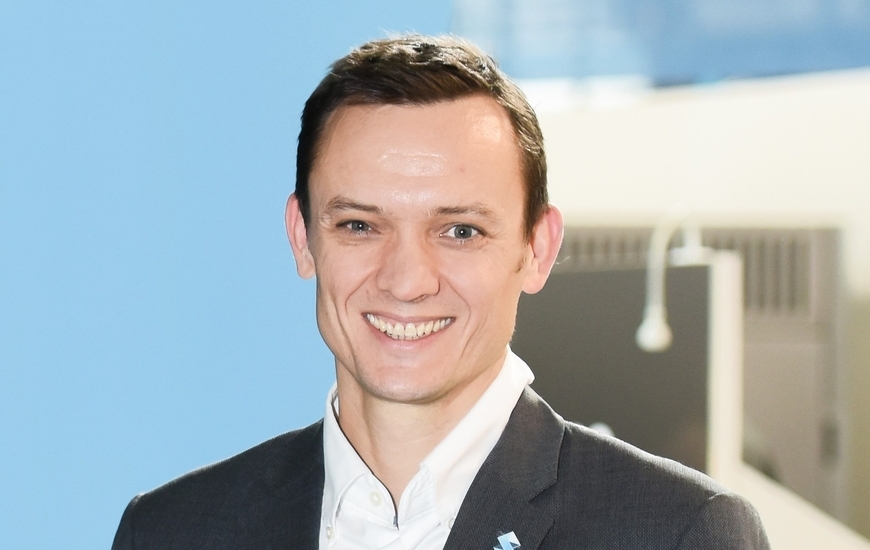by NICOLA CATENARO
Composites Portal asked Yann Rageul, Commercial Leader Industrial BU EMEA & Asia at Stratasys, his opinion about 3D printing and the future of composites. See in the following interview his answers and point of view.
What are the benefits of 3D printing applied to the industrial machinery manufacturing sector?
"Additive manufacturing (AM) brings a new level of flexibility to the industrial machinery manufacturing sector. In today's environment, many companies are striving to reduce costs and production time and optimise processes, therefore the ability to use 3D printing to quickly produce components and finished parts is the most effective response to current needs. According to our estimates, an average industrial-level company produces hundreds to thousands of complex parts per year, which is quite a small amount by mass production standards. Resorting to traditional methods would imply long lead times and high costs. This is where AM makes the difference. With industrial-grade SAF™ technology from Stratasys, it is possible, for example, to produce high-quality components - i.e. with the robustness, consistency, accuracy and repeatability required to meet product performance expectations - in large volumes, but also with the ability to differentiate each part, if necessary, without impacting time and cost. Indeed SAF can produce 1,000s of parts in 12 hours, while being more cost effective than injection moulding, with cost saving between 40% and 90% typically for volume in the thousands of parts. This new flexibility brings value to the production of industrial machines and contributes to increasing the competitiveness of companies in the sector".
Design and 3D printing: what are the next challenges of this 'partnership'?
"Designing for traditional manufacturing such as machining and injection molding is restricted by the inherent limitations of those technologies. In contrast, AM doesn’t have those limitations, and this enables the engineers to concentrate on the actual design rather than on manufacturability. AM provides manufacturers with a set of capabilities that eliminate the constraints governing traditional manufacturing processes, as well as extensive design freedom, which results in better, lighter but equally strong and performant parts. Whereas traditional machine tooling has physical limitations and products made with that technology must be designed to accommodate those limitations – through a process called “design for manufacturability” (DFM), using AM instead of traditional machining frees designers from all the constraints of DFM. Now called “design for AM” (DFAM), the new AM process opens new possibilities to engineers and designers, but to reap the full benefits, it is required to learn and apply the new AM paradigm".
Will 3D printing revolutionise the traditional manufacturing industry? In what way?
"I believe that 3D printing is already revolutionising the manufacturing industry. The most advanced AM technologies are now widely used to produce ready-to-use, functioning parts in various sectors, from aerospace to automotive. And, as technology continues to evolve, AM is fast approaching the world of industrial production to compete with - or complement - moulding and machining for mass production applications. With our SAF and P3 platforms, we have achieved unprecedented production results. These advanced technologies make it possible to achieve very high levels of quality and aesthetic finish (comparable to that achieved with injection molding) thanks to the tight control and inherent stability of the process, and thanks to high-performance materials of the latest generation. At present, AM is the winning choice on productions requiring high volumes of small parts or products with complex designs that are difficult to produce using traditional methods. The ability to combine AM technologies with traditional production methods depending on volume or application offers companies a new level of flexibility".
Regarding composites, how could 3D printing improve and expand their use and in which sectors in particular?
"Composite manufacturing can benefit from AM in several ways and in many areas. Composites parts can be replaced with components with equivalent functionality but produced with AM to save time and cost. In the same way, composite tooling can be replaced with AM tooling. Autoclave tools can be replaced with 3D printed parts using high temp filaments (e.g., ULTEM1010) providing comparable behavior under thermal load or auxiliary tools replaced with 3D printed parts capable of fulfilling each requirement (e.g., trim guides in ABS, no need for high temp or stiffness, drill guides in Nylon12CF as high stiffness is needed). Stratasys features a team of engineers dedicated to developing and characterizing new materials and processes for composite tooling applications. We’ve been fortunate enough to work with aerospace industry leaders such as Airbus and Boom Supersonic to successfully introduce and qualify this technology into their existing manufacturing processes. We also work with several successful manufacturers across motorsport, the transport sector, and the naval industry that benefit from AM and 3D printing adoption thanks to the right mix of high-added value, complex shapes and low to mid-volume for produced parts".
WHO IS
Yann Rageul is the Commercial Leader Industrial BU EMEA & Asia at Stratasys. He is responsible for driving the manufacturing segment of the company, with a keen focus on supporting clients to solve their supply chain issues through additive manufacturing.
Yann joined Stratasys in 2015, bringing with him over 20 years of experience in strategic consultancy and industrial manufacturing technology sales.
Prior to working at Stratasys, Yann held managerial positions at Romax Technology and Ricardo Strategic Consultancy. He is also a board member of Additive Flight Solutions Pte Ltd. Yann holds an MBA from IAE France and a master’s degree from Institut français de Mécanique avancée.
-

-
12 October 2022






















